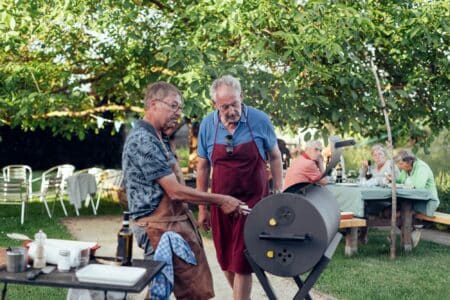Navigating Retirement Relocation: A Guide for Seniors

Embarking on a retirement relocation can signal the beginning of an exciting new chapter in life. It’s a time filled with potential for relaxation, adventure, and a lifestyle that aligns with your long-term aspirations. However, choosing a new place to call home isn’t just about picking a location—it’s about finding a community that supports your wellness, hobbies, and social connections. It’s also about ensuring your financial security and accessing essential services that will help maintain your quality of life as you age.
As you consider this significant life change, it’s vital to approach it with a strategic plan. Our guide is here to walk you through the process of retirement relocation, helping you consider all important aspects – from cost of living and healthcare facilities to climate and cultural activities. Whether you dream of beachside serenity, a quiet countryside, or an active urban environment, taking a thoughtful approach will help make your move both enjoyable and seamless.
So, let’s dive into the factors that will help you make an informed and fulfilling decision on where to spend your golden years. With the right preparation, your retirement relocation can be less of a daunting undertaking and more of an exhilarating journey towards a fresh start.
CONTENT
Understanding Retirement Relocation: An Overview
Retirement relocation marks the beginning of a new and exciting phase in life, as individuals seek to optimise their living situation while enjoying their well-deserved retirement. Whether it’s downsizing to a more manageable and affordable home, moving to a new climate for health reasons, or seeking a vibrant community with plenty of amenities, the reasons for relocating in retirement are as diverse as the retirees themselves. Navigating this new chapter successfully involves careful planning and consideration of the various factors that can impact one’s overall well-being and lifestyle satisfaction.
Understanding the complex layers involved in retirement relocation can allow retirees to make informed decisions about where to spend their golden years. It’s not merely about moving to a new location—it encompasses creating a fulfilling retirement lifestyle that aligns with personal values, interests, and long-term goals. With a comprehensive understanding of the various aspects of retirement relocation, individuals can approach the transition confidently and ensure that every element, from financial implications to social opportunities, is carefully considered.
The overview of retirement relocation takes into account the emotional and practical elements of this stage in life, offering insight into the multifaceted considerations that retirees may encounter. By embracing this comprehensive view, individuals can approach their retirement relocation with a sense of empowerment, enabling them to make well-informed choices and ultimately realise their vision for an enriching and satisfying retirement lifestyle.

Assessing Your Retirement Lifestyle Preferences
When it comes to retirement relocation, one of the most important steps is assessing your lifestyle preferences to determine the type of environment that will best suit your needs and desires. This includes considering factors such as your desired level of activity, access to amenities, and the type of community that will provide the social connections and support you seek in retirement. Understanding your lifestyle preferences is crucial for finding a location that aligns with your vision of an enriching and fulfilling retirement.
Assessing your retirement lifestyle preferences also involves reflecting on the activities, hobbies, and interests that bring joy and purpose to your life. For some, proximity to cultural venues, recreational facilities, and opportunities for lifelong learning may be essential, while others may prioritise access to nature, outdoor activities, and a peaceful, serene setting. By identifying these preferences, you can narrow down potential retirement locations that offer the lifestyle features and resources that are most meaningful to you.
Another aspect of assessing lifestyle preferences is considering your desired level of social engagement and community involvement. Whether you seek an active, vibrant community with frequent social events and group activities, or a quieter, close-knit neighbourhood with strong community bonds, understanding your social preferences will guide you in selecting a retirement destination where you can build meaningful connections and thrive socially. This introspective process will help ensure that your retirement relocation leads you to a place where you can live life on your own terms, in a setting that resonates with your unique lifestyle preferences.
Financial Considerations for a Successful Relocation
Financial considerations play a pivotal role in the successful relocation of retirees, as this life transition demands careful financial planning to support a comfortable and sustainable retirement lifestyle in a new location. Evaluating the cost of living, property prices, and taxes in potential retirement destinations is essential to ensure that your financial resources align with the financial demands of your new home. It’s important to consider not only the initial cost of relocating but also ongoing expenses to maintain your desired standard of living.
Furthermore, exploring the potential impact of relocation on your retirement income, pension, or social security benefits is crucial. Different locations may have varying tax rates and regulations that can affect your financial situation, making it vital to understand how a relocation could impact your financial security and tax liabilities. Working with financial advisors and accountants who specialise in retirement relocation can provide valuable insight into the financial implications of moving to a new area and help you make informed decisions.
In addition to the immediate financial aspects, retirees should also consider long-term financial sustainability in their new location. This includes assessing the availability and affordability of healthcare services, long-term care options, and the overall economic stability of the area. By carefully evaluating the financial landscape of potential retirement destinations, retirees can proactively plan for their financial security and ensure that their relocation supports a fulfilling and economically resilient retirement lifestyle.

Selecting Your Ideal Retirement Destination
Selecting your ideal retirement destination involves a thoughtful exploration of various factors to ensure that the chosen location aligns with your vision for a fulfilling retirement lifestyle. Considerations such as climate, proximity to family and friends, access to healthcare, cost of living, and the availability of recreational and cultural activities all contribute to the decision-making process. By carefully evaluating these factors, you can identify a retirement destination that embodies the features and resources that are most important to you.
The climate of your prospective retirement destination can significantly impact your overall well-being and quality of life. Whether you prefer a temperate climate, a warmer coastal setting, or a cooler mountainous region, understanding how different climates can affect your physical and emotional health is crucial. Climate considerations also extend to factors such as air quality and the presence of natural disasters, which can influence the overall suitability of a location for retirement.
Proximity to family and friends is another significant aspect of selecting a retirement destination. For many retirees, being close to loved ones provides a sense of emotional support, social connection, and the opportunity to actively participate in family events and milestones. Conversely, some individuals may seek a fresh start in a new location, prioritising other lifestyle factors over geographical proximity to family. Understanding the role of family and social connections in your retirement years will guide you in selecting a destination that best meets your relational and emotional needs.
Healthcare Access in Your New Home
Access to quality healthcare is a critical consideration when relocating in retirement, as it directly impacts your overall well-being and peace of mind. Assessing the availability of medical facilities, hospitals, specialists, and primary care physicians in potential retirement destinations is essential to ensure that you can access the healthcare services you may need as you age. Additionally, evaluating the quality of healthcare in your chosen location and understanding the range of medical services available will provide confidence in your ability to maintain good health in your new home.
Furthermore, considering the affordability and accessibility of healthcare services in your prospective retirement destination is vital for long-term financial planning and peace of mind. Understanding the cost of medical care, health insurance options, and potential out-of-pocket expenses will help you assess the financial implications of healthcare access in relation to your retirement budget. Exploring the availability of preventative care, wellness programs, and senior-specific medical services can also contribute to your overall well-being and healthcare satisfaction.
In addition to the physical healthcare infrastructure, exploring the availability of community-based wellness programs, support services for aging adults, and access to long-term care options is important for a comprehensive understanding of healthcare access in your new home. Considering the potential need for home care, assisted living, or other forms of long-term support will ensure that you can access the necessary services to support your health and independence as you age in your chosen retirement location.

Cultural and Recreational Activities for Retirees
Exploring the cultural and recreational activities available in a retirement destination is essential for retirees seeking a fulfilling and enriching lifestyle. From art galleries, museums, and theatres to community festivals, hobby groups, and social clubs, the cultural landscape of a location offers opportunities for intellectual stimulation, creativity, and meaningful social engagement. By evaluating the range and quality of cultural activities in potential retirement destinations, retirees can find a place that aligns with their interests and provides ample opportunities for exploration and enrichment.
In addition to cultural pursuits, recreational activities play a vital role in retirees’ overall well-being and quality of life. Whether it’s hiking trails, golf courses, community centres, or access to nature reserves, the availability of recreational opportunities contributes to maintaining an active and healthy retirement lifestyle. Assessing the outdoor, fitness, and leisure options in prospective retirement destinations can help retirees identify a place that supports their preferred activities and hobbies, allowing them to stay physically, mentally, and emotionally engaged in their new community.
Another important aspect of cultural and recreational activities for retirees is the opportunity to engage in lifelong learning and personal growth. Many retirement destinations offer access to educational classes, workshops, and continuing education programs, providing retirees with the chance to pursue new interests, expand their knowledge, and cultivate new skills. This emphasis on personal growth and intellectual curiosity contributes to a vibrant and fulfilling retirement experience and promotes a sense of ongoing purpose and vitality.
The Role of Climate in Choosing a Retirement Location
The climate of a retirement location plays a significant role in shaping the overall lifestyle and well-being of retirees. For many individuals, the appeal of a particular climate lies in its ability to support a desired level of physical comfort, whether that involves warm, sunny weather, a temperate climate, or a cooler environment. Understanding the impact of climate on personal well-being is pivotal, as it influences activities, outdoor pursuits, and overall enjoyment of day-to-day life. By considering the role of climate in choosing a retirement location, individuals can select a place that best suits their preferences for temperature, precipitation, and seasonal variations.
Moreover, retirees often factor in the potential health benefits of a particular climate when making relocation decisions. Some may seek out regions with cleaner air, lower pollution levels, or specific environmental conditions that are better suited to managing respiratory conditions, allergies, or other health concerns. Climate also plays a role in mental well-being, as access to natural sunlight, mild temperatures, and scenic surroundings can contribute to a positive outlook and overall happiness. By carefully considering the role of climate in their retirement location, individuals can enhance their overall health and well-being in their chosen environment.
In addition to personal preference and health considerations, the role of climate in choosing a retirement location extends to its impact on outdoor activities, sports, and recreational pursuits. Whether retirees enjoy spending time outdoors, engaging in gardening, or participating in sports and fitness activities, the climate of a location directly influences their ability to pursue these interests. Understanding the seasonal patterns, weather conditions, and overall suitability of the climate for preferred activities is crucial for maintaining an active and enjoyable retirement lifestyle.

Building Social Connections Post-Move
Building social connections post-move is a crucial aspect of the retirement relocation process, as it contributes to a sense of belonging, community, and overall well-being in a new environment. Making an effort to connect with neighbours, local groups, and community organisations can lead to meaningful friendships and social support networks, fostering a sense of inclusion and camaraderie. Whether it’s joining clubs, attending social events, or participating in volunteer activities, engaging with the community is an opportunity for retirees to create valuable social connections and establish roots in their new home.
Furthermore, technology offers various platforms and tools that can facilitate social connections, especially for those who may have relocated far from their established social circles. Utilising social media, online communities, and digital platforms can help retirees stay connected with distant family and friends, as well as meet new people in their local area. Engaging in virtual events, video calls, and online interest groups can provide avenues for social interaction and friendship-building, enhancing the overall sense of connectedness and belonging post-move.
In addition, retirees can consider seeking out senior centres, community centres, and organisations that cater to older adults, offering a range of programs, classes, and social activities tailored to their interests and needs. These community-based resources provide valuable opportunities for social engagement, skill-sharing, and the chance to connect with others who are on a similar journey in their retirement years. By actively participating in these community offerings, retirees can establish a sense of community, purpose, and social vitality, enriching their post-move experience and fostering meaningful connections in their new location.
Navigating the Real Estate Market as a Retiree
Navigating the real estate market as a retiree involves a strategic approach to finding a home that aligns with your current and future needs. Downsizing is a common consideration for many retirees, as it can simplify living arrangements, reduce maintenance responsibilities, and free up financial resources. Exploring the availability of smaller homes, townhouses, or retirement communities can provide viable options for retirees looking to optimise their living space for a more comfortable and manageable lifestyle. Additionally, considering retirement-specific housing options, such as age-restricted communities or senior living developments, can offer amenities, social opportunities, and a supportive environment that cater to the unique needs of retirees.
For those considering a relocation to a new area, conducting thorough research on the real estate market, property values, and housing trends is fundamental. Exploring the housing inventory, average selling prices, and market conditions in potential retirement destinations can provide valuable insight into the feasibility of finding a suitable home within your budget. Engaging with local real estate agents who specialise in retirement relocations can offer expertise and guidance in navigating the housing market, ensuring that retirees can make informed decisions when searching for a new home.
Moreover, financial considerations play a pivotal role in navigating the real estate market as a retiree, particularly when it comes to buying, selling, or renting property. Assessing the affordability of housing, property taxes, homeowners’ association fees, and potential utility expenses in different locations is essential for long-term financial planning. Evaluating the financial implications of housing options in relation to your retirement budget will help ensure that your housing choice supports a sustainable and fulfilling retirement lifestyle. By navigating the real estate market with a clear understanding of your housing needs, financial capabilities, and future aspirations, retirees can find a home that suits their lifestyle and supports their long-term well-being.

Planning Your Move: A Step-by-Step Approach
Planning your move as a retiree requires a methodical and comprehensive approach to ensure a smooth and successful transition. Start by creating a detailed checklist that outlines all the tasks and logistics involved in the relocation process. This should include key steps such as decluttering and downsizing belongings, researching potential retirement destinations, securing housing arrangements, hiring a moving company, and coordinating the transfer of utilities and important documents. Taking a proactive and organised approach allows retirees to tackle each aspect of the move systematically, alleviating stress and providing a clear roadmap for a well-executed relocation.
In addition to creating a checklist, it’s essential to establish a timeline for the move, setting realistic deadlines for each task in the relocation process. Prioritise tasks based on their urgency and importance, giving special attention to critical steps such as selling a current home, finding a new residence, and arranging for the physical move. By breaking down the relocation process into manageable phases with designated timelines, retirees can maintain a sense of control over the move and ensure that all necessary arrangements are completed in a timely manner.
Furthermore, enlisting the help of professional services, such as real estate agents, moving companies, and relocation specialists, can provide valuable expertise and support throughout the planning process. Working with professionals who specialise in retirement relocations can offer guidance in navigating the unique considerations of moving in retirement, ensuring that retirees receive tailored advice and assistance specific to their needs. This collaborative approach can streamline the relocation process, reduce potential challenges, and provide retirees with peace of mind as they prepare for their move to a new location.
Settling In: Tips for the First Few Months
Settling in after a retirement relocation is an important phase that requires patience, open-mindedness, and a willingness to adapt to a new environment. Take the time to explore your new neighbourhood, familiarise yourself with local amenities, and connect with your neighbours and community members. Embracing a sense of curiosity and discovery can help you acclimate to your new surroundings and begin to feel at home in your new location. Whether it’s discovering nearby parks, local cafes, or community events, immersing yourself in the local lifestyle can make the transition smoother and more enjoyable.
Seek out opportunities to build social connections and expand your social network in your new community. Joining clubs, attending community gatherings, and participating in local events can be valuable avenues for meeting new people and establishing meaningful relationships. Embracing a spirit of openness and friendliness can make it easier to form connections with others who may share your interests, hobbies, or background, creating a sense of warmth and belonging in your new home.
Fostering a sense of routine and structure in your daily life can also contribute to a sense of stability and familiarity as you settle in. Establishing regular activities, whether it’s a morning walk, coffee with neighbours, or a weekly hobby group, can provide a comforting sense of normalcy and routine. Embracing new routines and engaging in familiar activities can help you feel grounded and established in your new environment, supporting a positive adjustment to your retirement relocation.

Staying Flexible and Embracing Change During Relocation
Staying flexible and embracing change during a relocation is vital to navigating the ups and downs that may arise throughout the process. It’s important to approach the move with a sense of adaptability and openness to new experiences, as unexpected circumstances can often present themselves. This flexibility can ease the emotional strain of the relocation and help retirees to maintain a positive outlook, even when facing challenges or adjustments.
Furthermore, remaining open to the prospect of change can lead to valuable opportunities for personal growth, learning, and new connections. Embracing change involves viewing the relocation as a chance to explore new horizons, engage with different cultures, and expand one’s perspectives. By maintaining a willingness to adapt, retirees can discover the potential for enriching experiences and possibility for the next chapter of their lives in a new location.
Moreover, embracing change during relocation involves maintaining a sense of patience, understanding, and self-compassion. Recognising that the transition may come with its share of uncertainties and adjustments will allow retirees to approach the relocation with a sense of resilience and grace. By acknowledging and embracing change as a natural part of the relocation process, retirees can cultivate a sense of optimism and adaptability, positioning themselves for a fulfilling and rewarding experience in their new home.
Conclusion
In embarking on the journey of retirement relocation, it’s clear that careful planning, thoughtful consideration, and a positive outlook are essential ingredients for a successful transition. By understanding the multifaceted aspects of relocation, such as lifestyle preferences, financial implications, and social connections, retirees can approach their move with confidence and purpose. Embracing change, staying open to new opportunities, and nurturing a sense of flexibility will enable retirees to navigate the relocation process with resilience and optimism, setting the stage for an enriching and satisfying retirement lifestyle in their new home.






